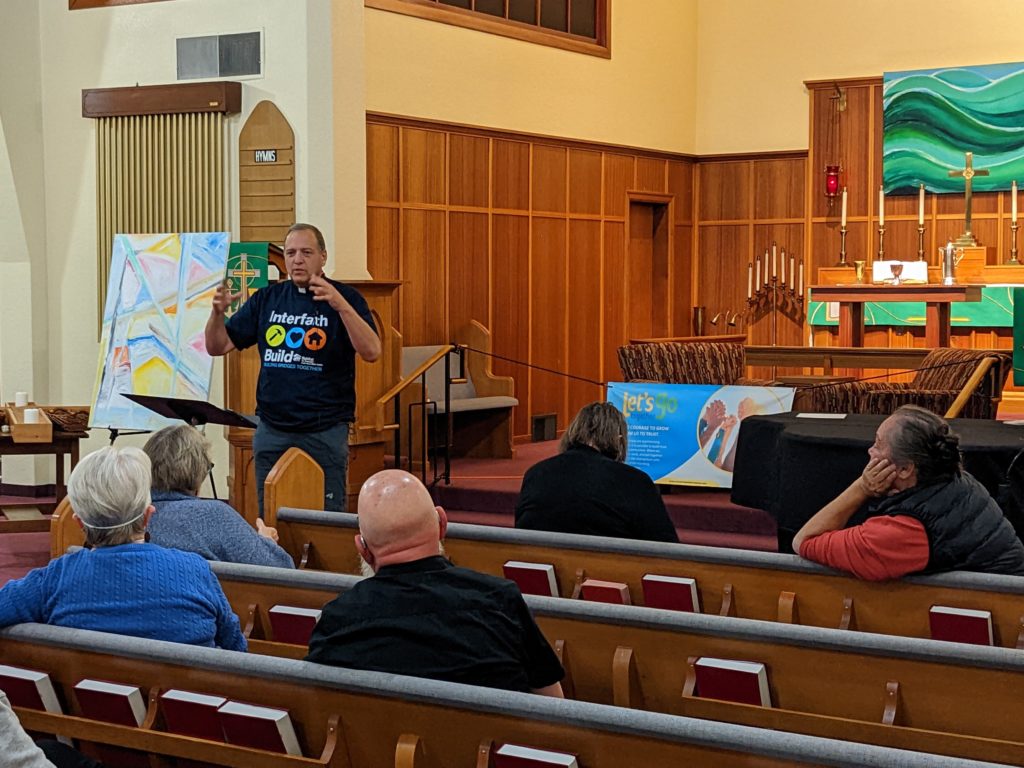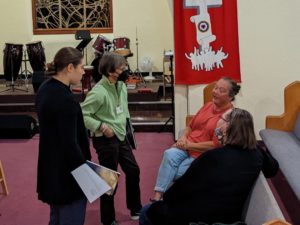
We’ve completed the first two sessions of our Let’s Go Together class at Burlington Lutheran Church in Skagit County. Our twenty participants, most of whom are members of this congregation, dove right into courageously exploring the true values of their faith tradition and they ways that Christians have fallen short of these values when it comes to honoring people from other traditions.
“Other Christians have told me not to hang out with certain people.” “I feel uncomfortable seeing how some of our hymns glorify war and Christian supremacy.” These vulnerable experiences were shared by many in the room. Some were moved to tears when, together with our co-facilitator Kay Knott, an elder of the Upper Skagit tribe, we looked at a historical painting depicting the Doctrines of Discovery. Kay explained that these 15th century decrees issued by the Vatican are not history to her. They have directly impacted her and her family’s lives. In them, the Pope Nicolas V sanctioned the brutal conquest and enslavement of non-Christian people in Africa and the Americas who were declared “enemies of Christ”. As Protestant churches emerged in Europe and the United States, they continued this approach. “That image brought back all the feelings of shame and that we don’t count that I grew up with,” Kay told us. And invited all present:
“Let’s share our stories, our family’s stories with each other. It’s so important that we feel heard. Then we can reconcile. Let’s honor each other’s traditions. We are better together.”

Course participants in conversation with Upper Skagit elder Kay Knott.
The class explored the notion of “unity in diversity”. In the monotheistic traditions of Judaism, Christianity, and Islam, this is grounded in the image of one Creator, and thus our unity as a human family. This unity encompasses the diversity of human cultures and beliefs. That pluralistic vision invites us to embrace and value our particular tradition and in-group, while at the same time recognizing others as human. A core value of these traditions is to be a blessing to all the human family, to speak well of and benefit them.
It was hard for our course participants to hear these truths about our shared history. It was hard for me to say them.
But one of the things we set out to do together in the Let’s Go Together program is to “celebrate disorientation”. We celebrate how conversations we are having are challenging us to a deeper understanding of our faith and our humanity. One of our participants bravely asked: “Are we trying to throw out the whole tradition?” I responded, no. Rather, we are using the core values of our tradition to evaluate how we are living out our tradition today. Jesus did the same. We honor his teachings when we engage in these conversations.
Martin Luther King, Jr. often taught that we are not responsible for the history into which we are born. Our responsibility is to understand our history and to create a better future. In the week after Father William Treacy’s death, one of the founders of Paths to Understanding, it felt especially meaningful to me to engage in this work. His friend Rabbi Levine challenged Father Treacy to learn the Jewish roots of the Christian tradition. And so we continue to learn from our history and learn to think, pray, and act for the benefit of all people and all creation.
